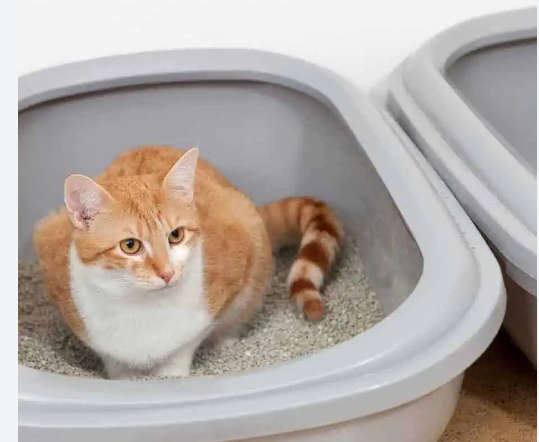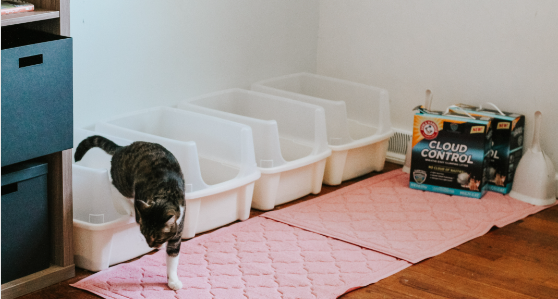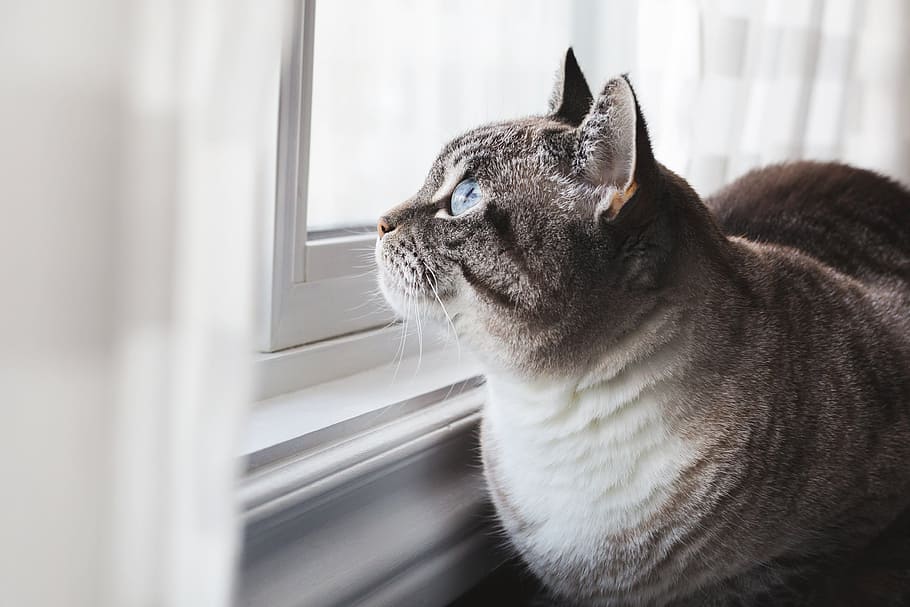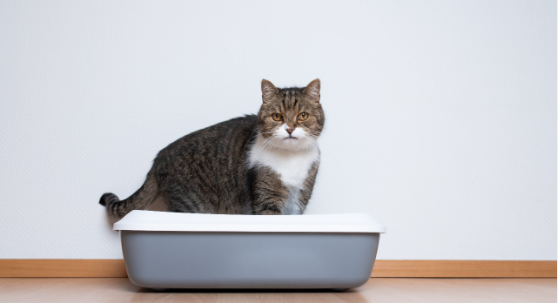Multiple Litter Boxes for Multiple Cats: Do I Need 2 Litter Boxes for 2 Cats?
The Importance of Litter Boxes for Cats
As a cat owner, it is essential to provide your feline companion with a clean and functional litter box. Litter boxes are vital for maintaining the health and well-being of your cat.
Not only do they help prevent messes and unpleasant odors in your home, but they also serve as a way for cats to eliminate waste comfortably. Cats are naturally clean animals that prefer to have a designated space to go potty.
By providing them with a litter box, you are ensuring that they have an appropriate area to perform this necessary bodily function while also preventing them from eliminating unwanted areas. In addition, having a litter box can help monitor changes in your cat’s urine or stool output, which can indicate potential health issues.
Brief Overview of the Topic: Do I Need 2 Litter Boxes for 2 Cats?
If you’re considering getting another cat or already have two feline companions, you may be wondering whether one or two litter boxes will suffice. The answer is not straightforward since it depends on several factors such as the number of cats in your household, the size and layout of your home, and the type of litter box you use. In this article, we’ll take an in-depth look at the importance of litter boxes for cats and discuss whether it’s necessary to have multiple boxes if you have more than one cat.
We’ll explore why having multiple litter boxes is beneficial for both you and your cats and provide some tips on how to maintain multiple litter boxes efficiently. So if you’re unsure whether two litter boxes are better than one or just want to learn more about providing optimal care for your feline friends, keep reading!
Why Having Multiple Litter Boxes is Important
Cats are Territorial Animals
Cats are territorial animals, which means they have a natural drive to mark their territory and guard it against other cats. When it comes to litter boxes, this can become an issue if there is only one available for multiple cats. One cat may become possessive of the litter box and prevent the other cat from using it, causing conflicts and stress between them.
By providing multiple litter boxes, each cat can have their own designated space to use without feeling threatened or territorial. This can lead to more peaceful coexistence between cats in the household and reduce the risk of litter box-related conflicts.
Avoiding Litter Box Conflicts Between Cats
Litter box conflicts between cats can be a major source of stress for both pets and pet owners. These conflicts often arise when one cat tries to prevent another from using the litter box or when a cat is forced to share a dirty or overcrowded litter box. These situations can lead to inappropriate elimination outside of the litter box, which creates unpleasant odors and messes around your home.
Having multiple litter boxes helps avoid these types of conflicts by ensuring each cat has access to a clean and comfortable space in which to eliminate waste. It also helps prevent overcrowding, making it less likely that one cat will block access for another.
Reducing Stress and Anxiety in Cats
Stressful situations like conflict over shared resources (like a single litter box) can lead to anxiety in cats. This anxiety can manifest itself in various ways such as excessive grooming or destructive behavior around your home. By providing multiple litter boxes, you are reducing your cats’ anxiety levels by removing any potential sources of conflict over this essential resource.
Each cat has its own safe space that provides comfort while satisfying their natural instincts. Overall, having multiple litter boxes creates a sense of security for your pets and helps reduce the risk of anxiety-related behaviors.
How Many Litter Boxes Do You Need?

When it comes to the number of litter boxes you need, there is a general rule that applies – one litter box per cat plus one extra. This means that for two cats, you should ideally have three litter boxes in your home.
This rule ensures that each cat has enough space to use the litter box comfortably, reducing the likelihood of conflicts and stress between them. However, the number of litter boxes needed can also depend on several factors such as the number of cats in your household, the size and layout of your home, and the type of litter box you use.
For example, if you have multiple floors in your home or a large house with several rooms, it may be necessary to place multiple litter boxes in different locations for easy access by your cats. Similarly, if your cats are elderly or have mobility issues due to health problems or injuries, having more than one litter box on each floor can make it easier for them to go about their business without strain.
The Number of Cats in Your Household
As mentioned earlier, having one extra litter box per cat is a good rule of thumb when determining how many litter boxes you need. This helps prevent conflicts between cats who may feel territorial about their designated toileting area. Even cats who get along well may become possessive when it comes to sharing resources such as food bowls or water dishes; therefore having more than one toilet area available can help keep everyone happy and reduce potential problems.
The Size and Layout of Your Home
The size and layout of your home can also impact how many litter boxes you need. If you live in a small apartment where space is limited or only have one floor in your house with limited room options for placing multiple boxes side-by-side, then consider stacking two (or more) smaller-sized containers next to each other instead of buying a larger single box. This way, your cats will still have enough litter box options without taking up too much space.
The Type of Litter Box You Use
The type of litter box you use can also influence how many boxes you need. For example, if you use a covered litter box, some cats may feel uncomfortable using it and prefer an open one instead. In this case, having multiple boxes with different designs and entrances can provide your cats with more choices and ensure that everyone has their preferred toilet area.
The number of litter boxes needed depends on several factors such as the number of cats in your household, the size and layout of your home, and the type of litter box you use. By following the general rule of one extra box per cat plus one extra and taking these factors into consideration when determining how many boxes to get, you can provide a comfortable toileting experience for all your furry friends.
Benefits of Having Multiple Litter Boxes
Reducing odor and mess
One of the most significant benefits of having multiple litter boxes is reducing the odor and mess that comes along with cat waste. When multiple cats share one litter box, it can become quickly overwhelmed, leading to unpleasant smells and an abundance of waste. By having multiple litter boxes throughout your home, you can ensure that all waste is contained and properly disposed of, reducing odors and minimizing overall mess.
Providing more options for cats to choose from
Cats are creatures of habit, but they also like to have options. By providing more than one litter box option in your home, you are giving your cats a choice in where they do their business. This could mean different locations for the boxes (such as upstairs vs.
downstairs) or different types of litter boxes (such as covered vs. uncovered or automatic vs.
traditional). Giving cats choices can lead to happier and less stressed pets.
Ensuring that all cats have access to a clean litter box
Another essential benefit of having multiple litter boxes is ensuring that all cats have access to a clean litter box when they need it. When only one box is available for multiple cats, it can become dirty quickly, leading to some cats being unable or unwilling to use it because they prefer a clean environment. With multiple options available throughout your home, you can ensure that each cat has access to a clean place to eliminate when needed.
This can help prevent accidents outside the box or territorial disputes between housemates over who gets priority use of the sole toilet in the house. Overall, providing multiple litter boxes for your multi-cat household will make life better for both you and your pets by reducing unpleasant odors and extra cleaning work while also keeping everyone happy with plenty of options for potty time!
Tips for Maintaining Multiple Litter Boxes
Regular Cleaning and Scooping
One of the most important aspects of maintaining multiple litter boxes is regular cleaning and scooping. This not only ensures that your cats have a clean place to do their business, but it also helps to reduce odours and mess in your home.
Ideally, you should scoop the litter boxes at least once a day, removing any clumps or solid waste. It’s also recommended to completely change out the litter and clean the box every few weeks, depending on how frequently it’s used.
If you find yourself struggling to keep up with scooping and cleaning duties, consider investing in an automatic litter box that can help to reduce the amount of manual labor required. These types of litter boxes typically have mechanisms that sift through the litter automatically, removing any waste without requiring any effort on your part.
Proper Placement of Litter Boxes Throughout the House
Another important aspect of maintaining multiple litter boxes is proper placement throughout your home. It’s recommended to have one more box than you have cats, but you should also ensure that they are placed strategically throughout your home so that all cats can access them easily. Avoid placing them in high-traffic areas or areas where there may be loud noises or other distractions that could scare your cat away from using it.
You may also want to consider placing each box in a different room or area of your home to provide more privacy for each cat. Additionally, if you have an older cat who has difficulty jumping up onto high surfaces or accessing certain areas of your home due to mobility issues, make sure that their litter box is located somewhere easily accessible for them.
Choosing Appropriate Types of Litter Boxes and Litter
The type of litter box and litter you use can also play a role in how easy it is to maintain multiple litter boxes. Open litter boxes are the most common type and come in a variety of sizes, shapes, and materials. However, other types of litter boxes, such as covered or self-cleaning options, may be easier to maintain or offer additional benefits like reducing odor.
When it comes to choosing the right type of litter for your cats, there are a few factors to consider. Some cats have preferences when it comes to the texture or scent of the litter they use, so you may need to experiment with different types until you find one that works for everyone in your household.
Additionally, try to avoid using scented litters that contain perfumes or chemicals as these can irritate your cat’s sensitive nose and lungs. Make sure that whatever type of litter you choose is safe for your cats to use and won’t cause any health issues over time.
Con
While there are many benefits to having multiple litter boxes for multiple cats, there are some potential downsides as well. For one, having more litter boxes means more cleaning and maintenance, which can be a hassle for some cat owners. Additionally, some cats may still prefer to use only one litter box, even if you provide them with multiple options.
Another potential con is the cost of purchasing and maintaining multiple litter boxes. While this may not be a significant concern for everyone, it is worth considering if you are on a tight budget or have limited space in your home.
It is important to weigh these potential cons against the benefits of having multiple litter boxes for your cats. Ultimately, the decision of whether or not to have two litter boxes for two cats will depend on your individual circumstances and preferences.
Conclusion
Providing multiple litter boxes for your cats is generally a good idea if you have more than one cat in your household. This will help avoid conflicts between cats and reduce stress and anxiety in your feline friends.
When determining how many litter boxes you need, it is important to consider factors such as the number of cats in your household and the size of your home. Ideally, you should have one litter box per cat plus one extra.
While there may be some downsides to having multiple litter boxes – such as increased cleaning and maintenance – these are typically outweighed by the benefits. Ultimately, investing in multiple litter boxes can make life easier for both you and your furry companions!




